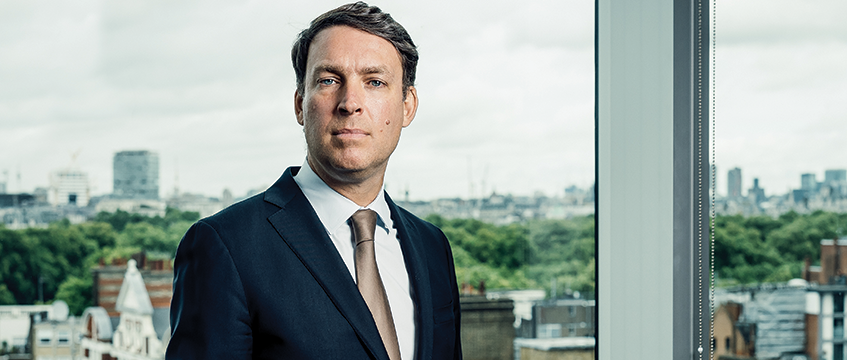Is PSP’s Stephane Jalbert serious about London?
“Is it a trophy?” ponders Stephane Jalbert, PSP’s managing director of real estate investments, casting an eye around his new office in PSP-owned block Verde, SW1. “It is certainly a big freehold in the West End that looks good.”
Punctuating an otherwise crane-cramped skyline in Victoria, the 317,083 sq ft landmark glass block is certainly living up to its status as a prize asset. And so it should with the £500m-plus price tag that PSP and joint venture partner Tishman Speyer have put on it.
Striking headquarters aside, Verde – which PSP is selling through GM Real Estate and Eastdil Secured – is not the only jewel in the investor’s London holdings up for grabs. It is also looking to recycle cash through the proposed sale of its £1bn student housing portfolio, which is managed by Greystar’s Chapter brand.
“Is it a trophy?” ponders Stephane Jalbert, PSP’s managing director of real estate investments, casting an eye around his new office in PSP-owned block Verde, SW1. “It is certainly a big freehold in the West End that looks good.”
Punctuating an otherwise crane-cramped skyline in Victoria, the 317,083 sq ft landmark glass block is certainly living up to its status as a prize asset. And so it should with the £500m-plus price tag that PSP and joint venture partner Tishman Speyer have put on it.
Striking headquarters aside, Verde – which PSP is selling through GM Real Estate and Eastdil Secured – is not the only jewel in the investor’s London holdings up for grabs. It is also looking to recycle cash through the proposed sale of its £1bn student housing portfolio, which is managed by Greystar’s Chapter brand.
But these sales will not signal the firm’s exit from the London market. It is, after all, a joint owner of the City’s largest, most high-profile and once-troubled development project – the 62-storey 22 Bishopsgate, EC3 – and jointly owns 12 London offices alongside Aviva.
Jalbert is adamant that, despite current economic uncertainty, PSP has long-term interests in the capital.
Plans are already afoot to re-invest capital from the Chapter sale into expanding the portfolio, and this is just the tip of the PSP iceberg when it comes to showing its commitment to the London and European markets. PRS and UK logistics could soon be on its hit list too.
So what is PSP’s ideal investment formula, how might it approach new asset classes, and just how serious is it about the London market?
[caption id="attachment_879934" align="alignnone" width="847"] 22 Bishopsgate, EC3[/caption]
The PSP approach
PSP tends to work with local operating partners on all of its assets. It works with Greystar on its student housing portfolio, and with SEGRO as part of a jv on its European logistics portfolio.
“They are a vital part of our business plan. They execute on the ground but we are there to make the right decision about the market.”
PSP likes its partners to invest cash, yet its deal structure varies depending on the partner or asset class.
“We always prefer our partners invest some money in transactions,” says Jalbert. “Sometimes it is a small minority interest, sometimes it is more 50/50 and sometimes it is a club deal.”
This is where the importance of flexibility comes into play. Once PSP has identified a market or sector in which it anticipates there will be growth, it hones in on one asset class and identifies the right operating partner. But it doesn’t always work as simply as that.
“There is always something that is not quite aligned,” he says. “Whether it is the market, the asset or the partner, there is always one you are taking a bet on. The ideal is to have all three, but we are flexible.”
Value-add and development opportunities are a PSP favourite, but it needs a partner with expertise to capitalise on maximum growth.
“We can’t invest in value-add and development projects ourselves, so we have access to partners that have a higher cost of capital and can be more sophisticated in terms of their approach,” he explains.
If the conditions are right, then these relationships can become long-standing.
“If we feel that there is a lot of market growth going forward, we will stay in. Sometimes from the get-go we have a long-term partner like with AXA at King’s Cross,” he says, referring to 6 Pancras Square, N1, the 365,000 sq ft block it developed in 2015. ”That deal was a great play. There was not much value-add to the building itself as a forward purchase, but a lot of asset management was involved in making sure we receive the right building and structuring the lease with Google. It was also being there at the right time.”
Portfolio optimisation
PSP is probably best known in London for Chapter, its student housing portfolio it has with Greystar. Its approach to the sector perfectly epitomises its investment strategy, with Jalbert highlighting this as one of his landmark deals.
“The student housing venture with Greystar came from a relationship we had in the US on the multi-family side,” he recalls. “We took advantage of the trend and we still believe in the trend for the long term in London. Our business plan is mostly zones 1 and 2, which is where we think there will be the highest concentration of international students that will be driving growth, and where there is a lack of purpose-built, well-functional student housing properties.”
Chapter is looking to double its 4,500-bed portfolio in the capital over the next five years.
First, it needs to complete its recapitalisation process. However, Jalbert is keen to wait until the right partner comes along.
“We are not in a hurry,” he says. “The right partner is important. We are working
on it.”
PSP’s approach to logistics in Europe has been more aggressive. On average, PSP and its 50/50 jv partner SEGRO have completed at least one deal every month since the partnership was formed in 2013.
With the boom in e-commerce pushing demand for logistics properties across Europe, Jalbert is quietly pleased that PSP got in when it did. He says that there are more acquisitions on the horizon for what will be a long-term venture focusing on strategic acquisitions through development.
“We have a huge land bank that we are going to be building,” he says of the venture with SEGRO. “Now that the sector attracts everyone, the cap rate has come down significantly. Now it is about increasing the cashflows and income. But you can’t create this return overnight. You need to work hard to provide the right level of service to your customer, your tenant, then you can start to increase the rent.”
PSP has not yet capitalised on the surge in logistics in the UK, but Jalbert does not rule it out, as long as pricing comes down. “We would like to [own logistics in the UK]. It is something that is missing in our portfolio, but it is very expensive.
“Maybe we will get into development or maybe we will explore a new strategy.
“The UK is an amazing market – you can have your goods within the same day, which is pretty amazing. We will see. We have a pretty good relationship with SEGRO and this is its home market.”
PRS in the UK could similarly be on the horizon, and Jalbert admits this is something he has considered.
“We have been looking for several years,” he says. “You need to have the right set of circumstances. The land processes have been very expensive, but hopefully they will come off a bit. We are going to follow the market – it is an interesting sector, but we have other things to do as well.”
Working with an existing partner would be a natural entry into the UK PRS sector, which would make Greystar a logical partner.
Lessons from London
In addition to expanding its student housing platform with Greystar in London, PSP will also look to develop and maintain its existing joint venture partnerships in the capital, such as its 12-asset office portfolio with Aviva Investors and King’s Cross
with AXA.
“The business plan for London is to continue to expand these joint ventures, to manage our portfolio, but also to build an organisational structure that will allow us to have a dynamic leadership that will not only manage these assets, but will also allow us to explore new ideas. But, we need to do our research,” he says.
While he is adamant that
PSP will be a long-term investor in London, Jalbert remains cautious of the complexities in the London market and the challenges it could pose.
Investing alongside developers Lipton Rogers, AXA Investment Managers – Real Assets, British Colombia Investment Management Corporation and Tamaesk in
22 Bishopsgate, formerly the Pinnacle, was not a straightforward decision given the 1.4m sq ft project’s scale, complexity and troubles under its previous ownership, which stalled the project for a period of time.
Given the current political uncertainty surrounding the UK that potentially has a direct impact on the City, Jalbert is less positive about letting prospects than he otherwise might be, but he is still confident that the quality of the building will see occupiers flood in.
“I think that, overall, the market will be difficult because of the uncertainty surrounding Brexit,” he says. “Rents will probably soften a bit, less in the West End than in the City, but it is still a fantastic play in the long-term. I am still a long-term believer in London.”
This could directly affect Jalbert and his leasing strategy for 22 Bishopsgate.
“It is a big building for the City,” he says. “Leasing it will be a challenge.
“The end product is going to be so spectacular that an institution like us can take
the risk.”
PSP in numbers
$135.6bn
Assets under management (£81.3bn)
725
Employees
56.9%
Invested in public markets
43.1%
Invested in private markets
19%
Share of portfolio that comprises European assets
€19.3bn
(£16.5bn) European NAV (£3.5bn in real estate)
210
Buildings in 10 countries
To send feedback, e-mail amber.rolt@egi.co.uk or tweet @AmberRoltEG or @estatesgazette
This article was originally published on 12 September 2017.











